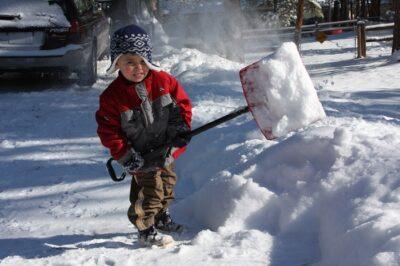Off-Grid, Salt-Free Alternatives To Chemical Deicers is republished from Total Survival
rock salt
Winter brings to mind wonderful visions of snow-covered fields, perfectly round snowballs and ice skating. It also brings memories of scraping ice off of car windshields, shoveling sidewalks and desperately trying to keep your footing on slippery walks from the house to the car. If you have ever experienced an early morning of ice scraping, sidewalk shoveling and slipping your way to your car, the idea of using deicers has certainly crossed your mind.
There is one thing to know about deicers. They aren’t made to remove all ice and snow from an area. Deicers are designed to break up the ice enough to shovel it away. There is a bit of chemistry involved based on the knowledge that the freezing point of salt water is lower than that of fresh water. When the ice melts from the deicer, a layer of water is created under the ice that allows the ice to be broken up and moved.
What’s Wrong With Using Salt?
The most common way to deice driveways and sidewalks is to use rock salt. Although cheap and easy to use, rock salt is concentrated and very corrosive. It affects plants, pets, water and even paint.
Rock salt can be found in nature, but it is spread out, unlike how we use it in our neighborhoods. Because the salt dissolves in water, it can flow and absorb into all sorts of ground and water areas.
The effect of this salt on your grass and other surrounding plants is simple: rock salt = dead plants. It will ruin your lawn because it limits the growth of plants. And it can drain into the ground water.
Beet Powder: The Ancient Secret To Renewed Energy And Stamina
Animals that drink the salty water or eat the salty grass often develop health problems. The most dangerous issue is salt poisoning. If you have to walk your dog on the salty city sidewalks, you have probably noticed how raw or inflamed the dog’s (or any animal’s) foot pads get from the salt.
Alternatives
Alternatives need to be healthy, safe and durable. They should contain ingredients that are non-corrosive to metals, plastics, paints and pavement. Having non-chemical alternatives will help keep your children, plants, pets and wildlife safe. Most alternatives are non-staining as well.

rock salt
Organic salts, or those that have acetate in them, are more biodegradable. Some examples of these salts are potassium acetate, calcium magnesium acetate and sodium acetate.
Here are some other mixtures and products that can be applied to ice to help break it up or make it passable:
- Mix one teaspoon of dish soap, one tablespoon of rubbing alcohol and ½ gallon of hot water. You can use more rubbing alcohol, if needed.
- A mixture of beet juice, alfalfa hay, tiny gravel and a touch of table salt. (Yes, cities are even using beet juice now.) There are different recipes, so experiment.
- Epsom salts will melt both ice and snow, and is said to be harmless to plants and animals.
- Sand or fine gravel provides more traction than ice-melting.
- Rubbing (Isopropyl) alcohol slows freezing, and is often used in commercial deicers.
- Snowmelt mat: Made of electric wires, this mat heats from underneath.
- Heated mats: Stays on the surface of the desired area, and melts snow and ice.
When to Use Deicer
If you have a powdery, dry snow, then don’t use deicer. Simply shovel or sweep the snow to prevent it from forming hard, packed layers. For heavy, wet snow, use deicing methods as soon as you notice the snow. For freezing rain, apply deicer before the freezing rain sets to prevent a buildup of ice.
If there is more than two inches of snow, you must shovel first. Putting deicer on thick snow will not melt enough to be helpful. When you get to a packed layer, or when you are near the bottom layer of snow, you can add deicer.
Remember: Always start by using the smallest amount of deicer and increase as needed. Within 15 minutes of application, the ice should start to melt.
What are your favorite organic deicing methods? Share your tips in the section below:
The post Off-Grid, Salt-Free Alternatives To Chemical Deicers appeared first on Off The Grid News.
This Article Was Originally Posted On offthegridnews.com Read the Original Article hereLearn More Here: Off-Grid, Salt-Free Alternatives To Chemical Deicers
No comments:
Post a Comment